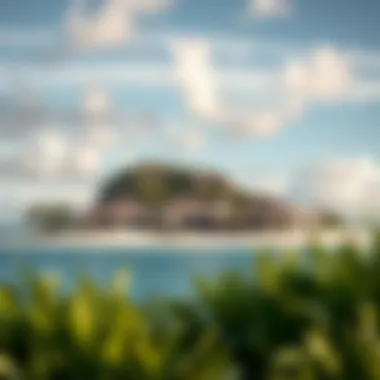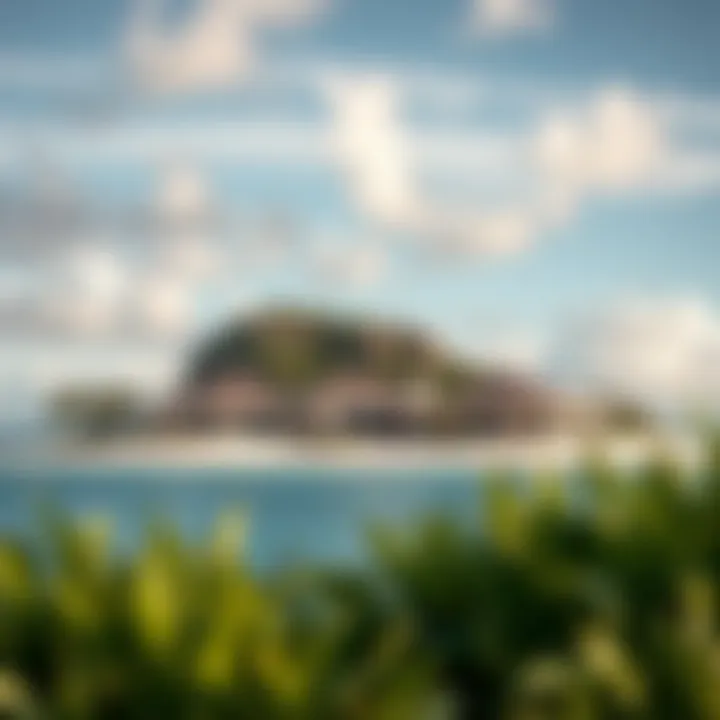Understanding the Private Island Purchase Journey


Intro
Investing in a private island is akin to stepping into an exclusive club, replete with rich histories and stories untold. The allure of owning your own slice of paradise often transcends mere real estate transactions. Potential buyers find themselves captivated by the serene beaches and the promise of seclusion, where the world outside blurs into obscurity.
But before diving into this ocean of possibilities, it’s crucial to navigate the waters with a clear understanding of what’s at stake. The process involves numerous considerations — legal frameworks, environmental assessments, and market dynamics. Each element ties into the larger narrative of island ownership, making it essential for any prospective buyer to approach this venture with caution and insight.
Market Trends
Current Real Estate Market Overview
The realm of private island sales isn’t as linear as typical real estate. Recent reports illuminated an upsurge in inquiries, especially among affluent buyers seeking new retreats. The average selling price of private islands can fluctuate dramatically, sometimes soaring into the millions, depending on location, accessibility, and natural features.
Different geographies are experiencing a range of shifts. For example, the Caribbean has remained a long-standing favorite for buyers, thanks to its crystal-clear waters and balmy climates. Buyers are increasingly drawn to regions such as Southeast Asia, where developing countries are making islands available at competitive prices, pointing to a globalization of the market where even remote pieces of land can attract significant investment. Moreover, the impacts of climate change, regulations, and tourism can disrupt or enhance local markets.
Emerging Neighborhoods and Investment Hotspots
In the quest for private island purchases, some regions have emerged as hotspots. Here are a few notable mentions:
- Bahamas: Home to more than 700 islands, its proximity to the US makes it a go-to for buyers. Many search for upgrades in amenities and better infrastructure.
- Bali: Indonesia’s Bali has increasingly attracted attention — resonating with those keen on culture, nature, and robust tourist infrastructure, making potential island developments appealing for both personal and rental usage.
- Canada's Gulf Islands: As interest in eco-tourism grows, islands near Vancouver are catching the eyes of investors, thanks to sustainable travel initiatives.
"Owning a private island is more than a status symbol; it embodies a lifestyle choice that’s becoming increasingly attainable for some."
The landscape can shift as rapidly as the tides. Continuous monitoring of these trends is essential for serious investors. Keeping an eye on legislation and economic climates will better inform buying strategies and reveal opportunities as they arise.
Understanding Private Island Ownership
Private islands often evoke images of beauty, exclusivity, and the ultimate escape from the hustle and bustle of daily life. Grasping the concept of private island ownership goes beyond just acquiring a piece of land; it encompasses a unique lifestyle, investment potential, and often a significant commitment to understanding legal and environmental considerations. This article serves as a guide for those looking to navigate the complexities associated with such a purchase, examining the rationales behind owning a private island, the financial implications, and the responsibilities that come with it.
Defining Private Islands
Before plunging into the whirlpool of private island ownership, it’s crucial to define what constitutes a private island. At its core, a private island is a landmass completely surrounded by water and is owned by an individual or a small group. However, the essence of a private island amplifies when one considers the nut and bolts of what it really means to own such a parcel. Unlike traditional real estate where ownership boundaries are often defined by visible infrastructure, island ownership requires owners to fully embrace both the geographical and logistical aspects inherent to such properties.
Ownership doesn’t merely imply possession; it also necessitates stewardship of the land. Each island presents its own unique mix of challenges and benefits, characterized by different factors like accessibility, topography, and existing infrastructure. For the aspiring buyer, understanding the details is paramount. It’s essential to differentiate between a deserted island, which may come with hidden costs like building expenses, and one that includes existing structures, which may mitigate initial expenses but require significant ongoing investment.
The Allure of Island Living
What is it about island living that pulls people toward its enchanting shores? For many, the appeal lies in the promise of tranquility, the sounds of lapping waves, and unspoiled natural beauty. These islands provide a retreat from modern life, offering an escape where one can find solace away from urban chaos. The lifestyle can be remarkably appealing.
Benefits of island living include:
- Privacy: Owning an island often translates to a level of seclusion that many crave.
- Natural Beauty: Surrounded by water, islands boast unparalleled views and immersive natural experiences.
- Lifestyle Flexibility: An island can serve numerous roles, from a serene retreat to a potential investment generating revenue through tourism or vacation rentals.
Yet, it's not all sunshine and rainbows. The challenges of island life are equally enticing. Accessibility issues, the need for reliable infrastructure, and weather-related concerns can't be overstated. Therefore, while the allure is strong, prospective buyers must weigh the practicalities against the dream of island ownership.
In summary, understanding private island ownership is an essential first step for any buyer interested in making this significant investment. The unique combination of beauty, privacy, and lifestyle opportunities sets islands apart, but so does the complexity involved in their ownership. This creates a landscape where informed decision-making is not just beneficial; it's imperative.
Market Insights
Understanding the realm of private island ownership goes beyond merely selecting the perfect slice of paradise; it requires savvy financial acumen, careful consideration of emerging trends, and a knowledge of geographic hotspots. Market insights serve as a compass for potential buyers, steering them through the complex waters of island acquisition.
The private island market is far more than a niche segment; it reflects broader economic currents, social trends, and shifting desires among high-net-worth individuals. Knowing current and future trends can help buyers make informed decisions, potentially increasing their investment's long-term value. It also offers insight into which locations are on the rise, allowing investors to capitalize on trends before they hit critical mass.
“In real estate, timing is everything. This is especially true for private islands, where market conditions can change more rapidly than one might think.”
Current Trends in Island Sales
Over the last few years, interest in private island purchases has seen notable fluctuations. With the rise in remote work due to the pandemic, the desire for seclusion has pushed many affluent buyers toward private islands. As this lifestyle becomes more desirable, inventories in many locations have tightened, leading to higher prices. Buyers are not only looking for a place to unwind; they seek a lifestyle that embodies privacy, luxury, and, increasingly, self-sustainability.
Recent data suggests that younger affluent individuals are more inclined to invest in small islands or an undeveloped paradise, prioritizing unique features over lavish constructions. Furthermore, with climate change becoming a pressing concern, many buyers are scrutinizing islands for their stability against rising sea levels and extreme weather.
- Remote work flexibility has boosted interest in islands suitable for extended stays.
- Unique offerings, such as solar power capabilities or natural reserves, are becoming attractive selling points.
- Demand is particularly surging in areas like the Caribbean and South Pacific, where the market remains diverse.
Key Locations for Island Acquisition
Identifying prime locations for private island purchases often requires a blend of geographical knowledge, cultural understanding, and market awareness. Some regions have proven particularly resilient and attractive for buyers.


- The Bahamas - With more than 700 islands, this archipelago remains a favorite for its proximity to the mainland U.S. and its reputation for stunning natural beauty.
- British Virgin Islands - Known for their crystal-clear waters and vibrant marine life, these islands provide both a tropical getaway and investment potential.
- Fiji - This South Pacific nation stands out for its pristine environments and significant development opportunities, especially for new resorts or eco-friendly projects.
- Panama - With its favorable tax regime and a growing expat community, it's gaining traction among buyers looking for investment plus lifestyle.
- New Zealand - This region appeals to those wanting pristine landscapes and tranquility, although prices in recent years have steadily climbed.
When delving into potential locations for island purchases, factors such as accessibility, local amenities, and environmental stability should always weigh heavily on the decision-making process. Some areas may offer attractive attributes but lack in infrastructure, which can lead to complications down the road.
In summary, market insights on private islands unveil the evolution of buyer preferences and highlight emerging investment opportunities. Investors and buyers need to stay ahead of trends and understand key locations to make informed purchasing decisions.
Financial Considerations
When it comes to acquiring a private island, financial considerations can neither be glossed over nor underestimated. The allure of owning a slice of paradise comes with its fair share of financial responsibilities and complications. Understanding these nuances is pivotal for any prospective buyer, as they can significantly influence the overall experience of island ownership. The financial landscape entails not only the initial purchase cost but also ongoing expenses and potential returns on investment. An informed buyer stands a better chance of enjoying the full benefits of this unique investment opportunity.
Assessing the Cost of Ownership
Determining the cost of ownership extends beyond the initial purchase price. Potential buyers should keep an eye on several critical factors that can impact their finances.
- Purchase Price: The price of the island itself usually varies widely, influenced by its size, location, and any existing infrastructure. For example, a pristine island in the Caribbean could range from a few hundred thousand to several million dollars.
- Infrastructure Costs: Many islands lack basic infrastructure such as roads, electricity, and water supplies. Buyers may need to budget sizable amounts for development. Building a dock, constructing a residence, or installing solar panels can be financial black holes if not properly accounted for.
- Maintenance Costs: Owning land isn’t just about the joy of sunsets and sandy beaches. Routine expenses, including property taxes, insurance, upkeep of any buildings, landscaping, and environmental assessments, all add up.
- Utilities and Services: Depending on the island's location, connecting to utility services can become pricey. Fuel for generators, waste management, and even internet services often carry a premium.
Therefore, performing due diligence on these factors is paramount before making any significant decisions regarding your purchase.
Financing Your Island Purchase
Financing the purchase of a private island doesn't work quite like buying a regular piece of real estate. Traditional mortgage options are often limited, and navigating these waters can get murky. Here are some avenues to consider:
- Cash Purchase: Many private island buyers opt for cash purchases, which sidesteps many of the complexities involved in financing. However, not everyone has such liquidity, and that’s where alternative means come into play.
- Private Lenders: Engaging with private banks or lenders who specialize in luxury real estate can open doors. They may offer terms that better fit the unique situation of island financing, including asset-based loans.
- Partnership Structures: Some buyers choose to go in with partners to share the financial burden. This approach can make luxury more accessible but comes with its own set of governance challenges.
It is crucial to evaluate all options carefully, as each comes with different implications for long-term financial health and ownership experience.
Tax Implications of Island Ownership
Tax implications can often be the sleeping giant in the ownership journey. Different jurisdictions have distinct tax regulations regarding property ownership, especially when it comes to islands. Here’s what to keep in mind:
- Property Taxes: Like normal real estate, private islands are usually subject to property taxes. These rates can vary significantly based on location. Some islands may have enticing tax advantages, but others can be hefty.
- Income Taxes on Rentals: If your island is leased out for vacations or events, any rental income generated may be subject to income tax, depending on the local laws. Don’t skip over this, as it can dampen financial returns.
- Transfer Taxes: When the time comes to sell, transfer taxes might apply depending on local legistaion. These can eat into profits if not anticipated.
- Estate Taxes: For those looking at long-term value, consider how the asset will be treated in terms of estate taxes. In some areas, these can be quite punitive and could affect plans for heirs who may inherit the island.
One cannot stress enough the importance of consulting legal and financial experts who are well-versed in these areas to avoid facing unexpected surprises down the line.
"The investment you make today should ensure not only a haven today but also financial security tomorrow."
By taking a comprehensive look at financial considerations surrounding a private island purchase, potential buyers can better navigate their journey to ownership, ensuring that it is both fulfilling and rewarding. Remember, it’s not just about buying land; it's about making an informed investment.
The Purchase Process
When considering the acquisition of a private island, it’s essential to understand that the purchase process can be quite intricate, often resembling a high-stakes game of chess. Each move must be deliberate, strategic, and informed, ensuring that potential buyers protect their interests while navigating through a maze of legalities and market expectations.
The purchase process not only involves tangible aspects like finances and paperwork but also influences one’s future living arrangements and lifestyle. It serves as the bedrock of successful island ownership, influencing everything from property valuation to personal satisfaction. Therefore, grasping the nuances of this step-by-step journey is crucial for anyone looking to invest in private island real estate.
Navigating Legal Requirements
Purchasing an island is not merely a matter of exchanging dollars for land. The legal requirements involved can be a hair-raising affair. Each jurisdiction has its own set of laws and regulations governing land ownership, which can include environmental inspections, zoning restrictions, and even local customs.
Buyers must first determine whether they can even develop an island as they envision—some locations may prohibit construction, while others may require permits that take months, if not years, to secure. Understanding local governance is also a must; when dealing with delicately balanced ecosystems, compliance with environmental laws becomes paramount.
An attorney with specialized knowledge in real estate, particularly in island purchases, will be invaluable in helping buyers traverse this complex landscape. They can help you decipher the multitude of contracts and negotiations that accompany such a unique transaction. In short, ensuring proper legal guidance helps transform a daunting process into a manageable one.
Selecting Experienced Real Estate Agents
Finding a real estate agent who specializes in private islands is akin to finding a needle in a haystack. This sector often requires agents with a deep understanding of niche markets, knowledge of unique legalities, and the ability to navigate the often murky waters of offshore transactions. It’s important to vet potential agents carefully, looking for experience, localized knowledge, and a solid track record in island sales.
An ideal agent should not only be well-versed in the nuances of island property but also possess strong negotiation skills, as it's not all smooth sailing in this world. This professional should act not just as a sales representative but as an advisor for understanding potential pitfalls and opportunities that may arise. Recommendations from previous buyers can provide real insights into an agent's efficacy.
Conducting Due Diligence
Conducting diligent research before sealing the deal is vital. This is where buyers can separate the wheat from the chaff, ensuring that what looks good on paper is, in fact, functional and viable in reality. Due diligence goes beyond a simple inspection; it encompasses much more. Buyers should consider:
- Physical Inspection: An in-depth walkthrough of the island is crucial to check for environmental issues, unsightly damage, or hidden costs that may not be immediately apparent.
- Assessing Surrounding Areas: One should take into account what lies beyond the borders of the property. Proximity to essential services, neighbors, and potential development plans in the vicinity can significantly influence both lifestyle and investment potential.
- Utilities and Accessibility: Ensure that necessary utilities like fresh water, electricity, and connectivity options are available. Assessing the ease of access could also save a buyer from future headaches.
"A diligent buyer does not merely close on a property; they enter into a lifelong partnership with the land. It’s important to know what you’re getting into."


Environmental Considerations
When it comes to purchasing a private island, the term 'environmental considerations' can no longer be an afterthought. This aspect plays a vital role, not only in helping buyers make informed decisions but also ensuring the sustainability of the island ecosystem. It is essential to break down these considerations into several key components, ranging from land use regulations to the delicate balance of the local ecosystems.
Assessing Land Use and Preservation
Land use on a private island is not just about building lavish homes or luxury amenities. Understanding the zoning laws and the potential for development is crucial; it ensures that the plans align with local regulations and environmental preservation efforts. Typically, islands are subject to strict environmental laws that reflect a need for conservation, as they often harbor unique flora and fauna.
Taking the time to consult with environmental experts can shed light on how to effectively utilize land while respecting its natural beauty. Buyers should contact local governments or agencies to get their paws on any existing land use plans, zoning classifications, or conservation easements. Being aware of these regulations can save future owners from hefty fines or even legal troubles down the road.
In addition, many islands have areas designated as protected lands, which can limit usage. It’s vital to recognize the balance between personal desires and the broader ecological implications. The enduring allure of living on a private island often hinges on the pristine environment it offers, and preservation is key to maintaining that charm.
Understanding Local Ecosystems
A private island is rarely just a slab of land; it serves as a vital piece of a larger ecological puzzle. Understanding the local ecosystems becomes paramount when considering an island investment. From the marine life inhabiting the surrounding waters to the birds nesting in the trees, each element contributes to the island’s character.
Before making any moves, potential owners ought to conduct an environmental assessment to identify species native to the area. This assessment helps in understanding how different organisms interact within the ecosystem, and it lays the groundwork for sustainable practices. For instance, certain species may be endangered or protected, which means restrictions on development or home alterations could apply.
Engaging with local environmental organizations can provide insight into conservation efforts and the potential impact of development projects. Furthermore, becoming a steward of the island's natural environment can enhance the experience of ownership, transforming it from mere property to a living, breathing entity.
There’s a saying that goes, "You reap what you sow." When it comes to private islands, this rings particularly true. Responsible land use and understanding of local ecosystems lead not just to personal satisfaction but also to a thriving habitat for future generations.
By acknowledging environmental considerations, buyers can preserve the beauty and vitality of their island. Equipped with knowledge and proactive strategies, investors will not only protect their investment but also enjoy a richer, deeper connection to the environment surrounding their private slice of paradise.
Post-Purchase Management
Managing a private island post-purchase is no small feat. Once the ink has dried on the contract, it's time to shift gears and focus on the operational side of ownership. This phase includes maintaining the island, ensuring the proper insurance is in place, and considering avenues for generating rental income. Each of these elements plays a crucial role in maximizing the investment and enjoying the property to its fullest.
Maintenance Considerations
Owning a private island often means embracing the beauty of nature while also confronting the challenges it presents. Regular maintenance becomes paramount for the longevity of your investment.
- Infrastructure upkeep: Islands may feature homes, docks, or even facilities for leisure activities. Ensuring these structures are well-maintained is essential; wear and tear can occur quickly due to exposure to the elements.
- Landscaping and vegetation control: Natural landscapes need tending. This includes not only aesthetic considerations but also management of invasive species, which can take over and disrupt local ecosystems.
- Utilities management: Unlike conventional properties, private islands may lack established utilities. Buyers often rely on solar panels and rainwater collection systems. Regular checks and maintenance on these systems can save costly repairs down the line.
Keeping guests comfortable also requires a steady hand. Upkeep helps create a seamless experience, encouraging repeat visits or rental opportunities.
Insurance Requirements for Islands
Insuring a private island carries its own set of nuances. The unpredictable nature of maritime environments makes it crucial to understand what kinds of coverage are necessary to protect both the property and your financial investment.
- Property insurance: Standard property insurance may not cover unique risks associated with islands, such as flooding, hurricanes, or even wildfires.
- Liability coverage: Hosting guests or engaging in rental can lead to unforeseen liabilities. Ensuring the right coverage can protect you from lawsuits and medical claims.
- Additional considerations: Be mindful of local regulations which may dictate specific insurance terms or necessary coverage limits. This is crucial for avoiding future legal headaches.
- Recommendation: Consult with specialized insurers who understand the unique landscape of island properties, ensuring you have coverage tailored to your specific risks.
Potential for Rental Income
One attraction of private island ownership is the potential for generating income by renting it out. In a world where unique experiences are at a premium, an exclusive island getaway can be a big draw.
- Market positioning: Carefully assess how to position your island in the rental market. Are you targeting high-end clientele or looking for a more laid-back, budget-friendly approach? Understanding your audience can significantly impact your rental strategy.
- Marketing strategies: Use social media, travel blogs, or dedicated rental platforms to showcase the unique charm of your island. Engaging imagery, video tours, and compelling narratives can help capture potential renters' attention.
- Seasonal considerations: Pay attention to when local tourism peaks. Timing your rental efforts with seasonal trends can boost occupancy rates and maximize profits.
- Luxurious features: Offering amenities such as private chefs, jet skis, or guided tours can set your listing apart.
Post-purchase management of a private island is as much about passion as it is about profit. Embracing the responsibilities that come with ownership not only safeguards your investment but also enhances the overall enjoyment of your unique slice of paradise.
Unique Challenges of Island Living
Owning a private island is a dream for many, but the reality of island living comes with its own unique set of challenges. These challenges significantly shape the experience of an owner and ought to be thoroughly considered before any purchase. From access to resources to community integration, understanding these factors can make or break your island experience.
Accessibility Issues
One of the most pressing challenges of owning a private island is accessibility. While the allure of seclusion is appealing, getting to and from your island can be a logistical puzzle. Many private islands lack developed airstrips. This means reliance on small planes or helicopters, which can be both costly and subject to weather conditions. Moreover, if your island is located far from mainland, any emergencies, like medical issues, can become more complicated.
Consider the location of your island carefully. For example, islands in the Caribbean like those near Saint Lucia are more accessible, thanks to established charter services and regional airports. On the other hand, an island off the coast of British Columbia may only have ferry services, making regular visits a matter of timing and planning.
The nuances of accessibility extend beyond transportation. Think about docking facilities for boats as well. A solid landing spot can ease access for guests, services, and deliveries. Without it, one may find boat trips laborious or even impractical during certain seasons.


Infrastructure Constraints
Another hurdle that island owners may have to face is infrastructure constraints. Building or maintaining a home on a private island often comes with obstacles that landowners on the mainland don't experience. Utility connections, such as water, electricity, and internet, might not be readily available. For instance, many islands rely on solar power systems and rainwater collection, turning self-sufficiency into both a challenge and an opportunity for innovation.
Among the infrastructure concerns, there is also road access; many islands do not have paved roads or any roads at all. This usually translates into a hefty cost for any construction necessary to improve access and services.
Managing waste disposal, as well, can be a bit of a conundrum. Islands may not have sewage systems, requiring septic systems or composting toilets, which brings environmental factors into play. The interaction between infrastructure and environment becomes ever more crucial as one plans their island lifestyle.
"Owning an island is not just a piece of paradise; it requires diligent planning and resourcefulness."
Investment Potential
The notion of purchasing a private island is not merely a whimsical dream; it represents substantial financial potential. In this section, we explore why considering the investment potential of private islands is essential for prospective buyers. Owning an island can be seen as an invitation to exclusive, tranquil living, but it’s also important to consider the long-term financial implications, opportunities for growth, and inherent risks.
Long-term Value of Private Islands
Investing in a private island can be a valuable asset down the line. The long-term value of these properties is influenced by various factors, including location, accessibility, and prevailing market conditions. Islands situated in desirable regions, such as the Caribbean or the Mediterranean, often appreciate more rapidly than others.
- Scarcity: The finite number of private islands enhances their value. With more affluent individuals seeking seclusion and unique investments, the demand often outstrips supply.
- Legacy Investments: Islands can serve as generational wealth, passed down to heirs. They often become family gathering places or vacation retreats, embedding emotional and financial value.
- Development Potential: Some islands come with opportunities for development, whether for personal use or commercial ventures, like luxury hotels or eco-resorts. Successfully executing such projects can significantly increase the value of the island.
However, buyers must also assess the ongoing expenses associated with ownership. Maintenance, taxes, and any necessary infrastructure investments can eat into potential returns.
Risks Involved in Island Investments
Like any investment, buying a private island carries its fair share of risks. It’s crucial to understand these factors before diving into such an exclusive purchase.
- Market Volatility: The market for private islands can fluctuate dramatically. Economic downturns may lead to drops in demand and thus property values.
- Accessibility Issues: Many islands are not easy to reach. Limited access can deter potential buyers or renters if you intend to generate income from the property.
- Environmental Risks: Islands are often vulnerable to natural disasters such as hurricanes or rising sea levels due to climate change. Prospective buyers should explore the island’s geographical and environmental conditions thoroughly before making a decision.
- Legal Complications: Navigating the legal landscape of island ownership can be intricate. Local regulations regarding land use, conservation, and building permits can impact your investment, especially if expectations are not aligned with local laws.
"Understanding the intricacies of each island as a unique investment opportunity is paramount. Long-term view coupled with grounded decision-making can lead to not just ownership, but true wealth creation."
Lifestyle Considerations
When contemplating the purchase of a private island, it’s paramount to grasp the lifestyle considerations that accompany such a significant investment. Beyond the financial implications and legal hoops, owning a private island shapes a unique way of life, complete with both enriching experiences and distinctive challenges.
Living on an island often reflects a desire for seclusion, autonomy, and a deep connection with nature. The decision to buy an island is as much about personal aspirations as it is about real estate; it’s a reflection of one’s values and lifestyle preferences. For many, it’s about escaping the daily grind and immersing oneself in a tranquil paradise away from urban chaos. That beckoning horizon of ocean can often symbolize not just beauty, but a reprieve from pressures of work and life.
Personal Factors Influencing Purchase
Several personal factors influence the decision to purchase a private island. The dream often starts with a vision of idyllic sunsets and serene mornings, but the reality requires careful thought.
- Goals and Intentions: Are you looking for a vacation retreat, a permanent residence, or perhaps a place to host gatherings? Clarifying your vision is essential.
- Lifestyle Preferences: Consider how you wish to live. Do you envision a rustic experience or a luxury abode equipped with all the modern amenities? This affects both the choice of island and how you’ll develop it.
- Family Dynamics: Family involvement can dictate the level of privacy and facilities required. Will children or grandchildren be frequent visitors? Does your partner share the same vision of the island lifestyle?
- Cultural and Social Connections: Is community important to you? Some buyers relish forging connections with locals, while others prefer solitude.
Ultimately, these personal considerations must align with your financial readiness and logistical capabilities, shaping not just the purchase, but the island experience itself.
Building a Community on a Private Island
While the idea of isolation can be appealing, many island purchasers often explore ways to create a sense of community. Building relationships, whether with neighbors on nearby islands or with locals, can enrich the overall experience of island living.
- Connecting with Neighbors: Engaging with other island owners establishes a network. Sharing resources, whether it's maintaining boats or exchanging local tips, can greatly enhance the experience.
- Local Involvement: Participating in local activities or community events fosters a sense of belonging. This may include supporting local business or engaging in environmental initiatives.
- Sustainable Practices: Many private islands embrace eco-friendly living. Collaborating with fellow residents on sustainability efforts creates a bond and even boosts the appeal of the island as a destination.
Building a community isn’t just about forming friendships; it’s about weaving a fabric of support, sustainability, and shared experiences that can transform isolated living into a cherished cooperative experience.
In summary, the lifestyle considerations of private island ownership require thoughtful introspection and an openness to new ways of living. Balancing personal desires with community involvement can significantly shape your experiences and define what island living truly means.
Closure
As we wrap up this exploration of private island ownership, it's clear that this venture is not merely about acquiring a piece of land; it's a multifaceted journey that demands thorough understanding and thoughtful consideration. The process of purchasing an island necessitates examining a range of key insights that can ultimately influence one’s decision. From the legal intricacies tied to ownership rights to the unique environmental and financial factors at play, each aspect serves as a crucial building block in the entire process.
Summarizing Key Insights
The articles’ comprehensive overview emphasizes a few pivotal points:
- Research is paramount: Prospective buyers must delve into legal requirements, localized real estate markets, and environmental implications before making any lucrative decision.
- Understanding financial implications: The costs associated with island ownership can range dramatically; thus, potential buyers should conduct thorough financial assessments, exploring options for financing along with possible tax ramifications.
- Invest in community: Establishing relations with local residents or securing trustworthy management services to aid with logistics can enrich the island living experience, as well as enhance resale value when the time comes.
Final Thoughts on Private Island Ownership
In the grand tapestry of real estate investments, owning a private island weaves its own intricate design. It opens doors to unparalleled experiences and lifestyle choices, yet it demands a certain level of dedication and responsibility. Island life is not without its challenges, such as accessibility and infrastructural limitations; however, for those fascinated by the idea of solitude or potentially lucrative rental opportunities, the trade-offs can imbuire the pursuit with rich rewards.
"Owning an island isn’t just about prestige; it’s about embracing a lifestyle intertwined with nature, freedom, and sometimes a bit of hardship. It's all in how you prepare for the journey."
By taking into account the indispensable insights laid out in this guide, prospective island buyers can navigate their path with ease, armed with knowledge and foresight.







